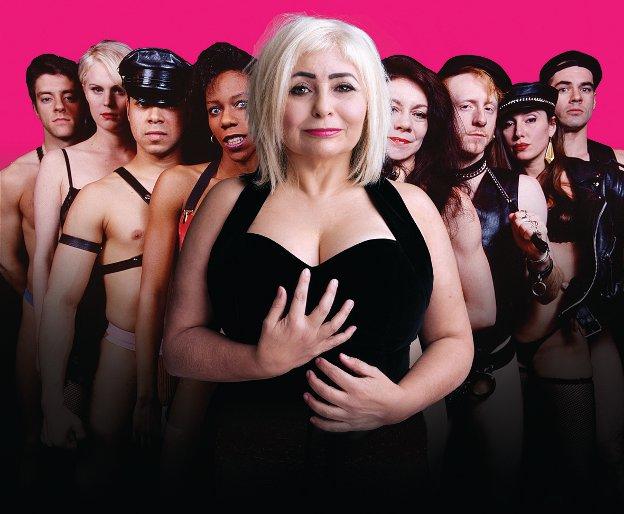‘There are lesbians in this room; there are gay men in this room; there are heterosexuals in this room; there are bisexual people in this room, are there not? There are transsexual people, asexual people… There are at least five kinds of gay men in this room and they don’t agree with each other about anything! There are people in this room who don’t identify with any particular group in this room. We need a new language to communicate our truth to each other – a language that doesn’t come from academia or politics, because a political language is a language of debate, and in a language debate someone wins and someone loses…’
This call comes towards the end of Penny Arcade’s seminal show Bitch! Dyke! Faghag! Whore!. Written and performed by Ms Arcade, created in collaboration with dramaturg/designer Steve Zehentner, and first performed in 1990, it’s a play that takes no prisoners – but in the best Stonewall / GLF tradition, the polemics and the partying go (sequin-gloved) hand-in-hand. The 2012 version, presented in London at the Arcola Tent for a month-long sell-out run in July, with a triumphant move for August/September to the Old Vic Tunnels, contains some additions and amendments to its core text, but remains in essence faithful to its original message – proving that although much has changed in queer art, theatre and politics over the past two decades, much else is ‘business as usual’.
The night starts, as perhaps all good nights out should, with a bevy of bright-eyed and bushy-tailed go-go dancers (male and female) performing both in the auditorium and on the stage. Then, our hostess arrives with a ‘Hey! My name is Susana Ventura but since I was 15 and raised by gay men, I’ve been called Penny Arcade.’ Intros over, we get a number of skits and sketches in which Penny plays a succession of female characters eking out a living in the sex trade – the phone girl at a massage parlour with a rapier tongue (‘What’s the difference between the half-hour and the hour? Thirty minutes, John.’); a conservative prostitute called Charlene who claims it’s all a question of economics, not sex (‘Honey, the sexual revolution did not do one thing for women in this world, except drive down the price of sex’) – before we move into a series of scenes in a more confessional-autobiographical mode that mix personal anecdote with radical perceptions.
Penny explains that being ‘raised by gay men’ doesn’t mean outings to the opera with her out father and his lover – ‘that’s a purely post-70s phenomenon’ – but rather that she was ‘taken in by a tawdry band of drag queens and their minions’. To Penny, she is what she is because of them, and ‘queer’ will always be something other than merely ‘gay’. She shares with Germaine Greer, David Hoyle and other pioneers of radical personal politics a belief that the goal is not acceptance into the establishment, but a constant querying of the sexual, social, political status quo. Like Jean Genet, she knows that the fear of the gay man is most often a fear of the feminine, and in particular the frivolous feminine.
She rails against what she calls ‘white-collar feminists’ who disapprove of striptease, burlesque and drag. There is a brilliant scene in the show in which a naked Penny (a voluptuous and beautiful 50-something) delivers a rant against a media that allows children to watch horrific scenes of war or torture on film or TV whilst censoring images of sex or nudity. What are we scared of, she asks. We’ve seen it all before, ‘there are no new holes’! The long speech ends with her saying: ‘Well, I guess by now you’ve probably forgotten I have my clothes off.’
Childhood confessions of illicit sexual behaviour with other children; reflections on the joys of being a bisexual faghag (a noble occupation); coming to terms with a relationship with a domineering mother; stepping away from an abusive working-class family suspicious of anything it deemed different or ‘other’; the horrors of the AIDS-ridden 80s; why so many lesbians prefer talking politics to having sex… the subjects come thick and fast, presented with an almost-Brechtian approach of seducing us into a exposé of a serious subject through song-and-dance and a vaudevillian staging.
There are, of course, costume and wig changes galore. There are the aforementioned go-go dancers, flashing lights, glitterballs, a specialist pole-dance interval scene and the feel-good disco music – Gloria Gaynor’s I Will Survive, almost inevitably, is in the mix, as is Hot Chocolate’s You Sexy Thing. There is a scene on secrets set in the dark, and a cameo appearance on film by the legendary Warhol superstar pseudo-priest Taylor Mead. There are the occasional topical additions – a reference to the ‘cyanide in the Olympic Torch’ urban myth, for example, and some surreal suggestions that eels from the Thames could be fried with rosemary and Marmite. There’s overall a kind of feisty optimism for the world, and in particular a cheer for multicultural London in which people ‘eat each other’s food and hear each other’s language’. Penny’s philosophy is ultimately one of the power of the bright lights, big city mentality to combat old-world peasant intolerances. There is also a touch of Julia from Orwell’s 1984 in her claim that the establishment ‘doesn’t want people to fuck, because people who fuck – think!’.
Bitch! Dyke! Faghag! Whore! is a celebration of femininity, of eroticism, of polymorphous perversity, of the power of personal politics. Its message, twenty years on, rings out loud and clear: we will survive, we won’t sit down, we won’t shut up, we won’t go away – we’re here to party for a world that believes ‘there is just one unity’. And yes, while we are all very different from each other, we are still, ultimately, overwhelmingly similar.


